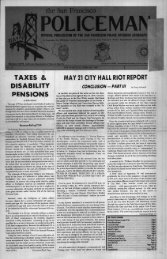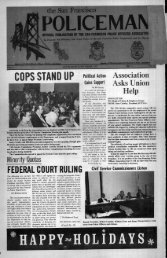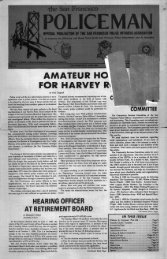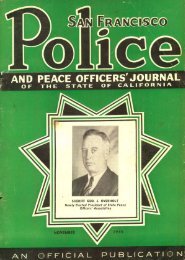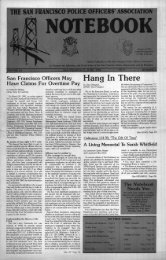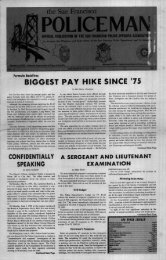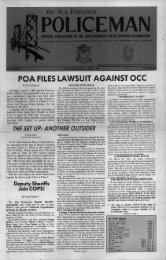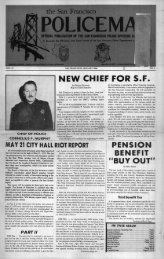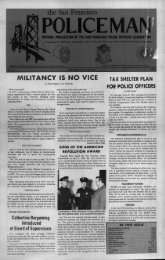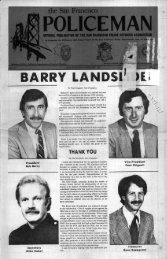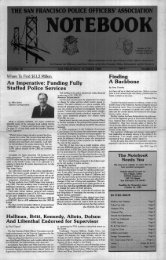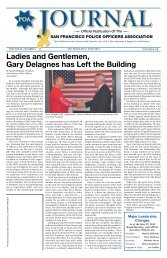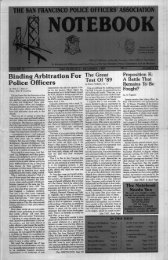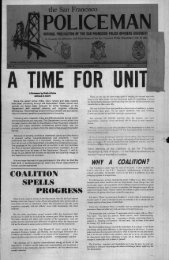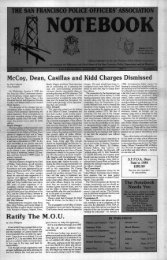(415) 822-1000 HOME (415) - San Francisco Police Officers ...
(415) 822-1000 HOME (415) - San Francisco Police Officers ...
(415) 822-1000 HOME (415) - San Francisco Police Officers ...
You also want an ePaper? Increase the reach of your titles
YUMPU automatically turns print PDFs into web optimized ePapers that Google loves.
Page 12 SAN FRANCISCO POLICEMAN December 1982<br />
Outlaw Motorcyclists a Problem for <strong>Police</strong><br />
By ROGER H. DAVIS<br />
Special Agent<br />
Federal Bureau of Investigation<br />
Washington, D.C.<br />
Outlaw Motorcyclists: A<br />
Sociopsychological Profile<br />
Motorcycle gangs constitute a bizarre subculture,<br />
but for some reason, have been "beneath the dignity of<br />
serious social scientists" to study. In dealing with<br />
emergent problem groups, such as motorcycle gangs,<br />
group behavior is important to understand. Any group<br />
of people - an occupational group, cultural group, or<br />
adult gang - develops special characteristics that set it<br />
apart from all others. A subculture may be based upon<br />
regional characteristics, common traits, occupations or<br />
interests, and may carry with it certain styles of dress<br />
and behavior.<br />
A motorcycle gang subculture is based upon a<br />
number of common factors, including a mutual interest<br />
in motorcycles. Other characteristics, however, also<br />
draw people to outlaw gangs. Outlaw gangs differ from<br />
many other groups in that their behavior goes beyond<br />
the dominant characteristics that set many other<br />
groups apart. Outlaw gang members challenge dominant<br />
features of American society, not only with their<br />
criminal behavior but with overt actions intended to<br />
shock. The shocking behavior we often see is, in fact,<br />
an open break with the value system of society.<br />
Language can be a component of subculture, and the<br />
language of an outlaw gang member sets him apart<br />
from other groups. An outlaw motorcycle gang<br />
member's language is saturated with vulgarity and with<br />
terminology that denotes a different meaning to an outsider.<br />
Terms such as "ape-hangers," meaning highrising<br />
handlebars, or a "fash truck," a van that follows<br />
the gang's motorcycle formation, are examples.<br />
Although these behavior patterns are subcultural<br />
characteristics, an understanding of the gang subculture<br />
is important because a look at the world as seen<br />
through the eyes of a gang member may aid the police<br />
officer in being more effective in dealing with motorcycle<br />
groups. Such an understanding is critical, since indications<br />
of future gang activities point toward a shift<br />
in behavior from the unruly freewheeling individualist<br />
of the 1950's and 1960's to the older, wealthier, and<br />
more deeply connected outlaw of the present.<br />
Persons from different subcultural groups behave in<br />
ways that differ from those of the mainstream 1 of<br />
American society. As one social scientist explained,<br />
value orientations differ among varying groups of people<br />
because the views and beliefs people have are the<br />
products of learning group relations. Most members of<br />
outlaw gangs are from lower or lower middle class levels<br />
of American society, and as such, bring with them their<br />
class-associated behaviors. Criminologist Walter Miller<br />
suggests that lower class people are characterized by<br />
distinctive values which not only differ from the values<br />
of the majority. of American citizens but also conflict<br />
with our legal code. As individuals with like values<br />
become more and more involved with outlaw gang<br />
members, some of these values are accentuated, reinforced,<br />
and accepted as modes of behavior within that<br />
group.<br />
Gang Member Initiation<br />
The process through which a potential member is<br />
assimilated into a gang is interesting. When a person<br />
ATTENTION Milk Shake Dieters!<br />
GOOD NEWS! An approved way to flavor your<br />
day with WATKINS LO-CAL EXTRACTS.<br />
For more information call or write<br />
Taylor Distributors, P.O. Box 5119,<br />
So. <strong>San</strong> <strong>Francisco</strong>, CA 94080 - 873-0609<br />
Tear/Gas • Baton • Firearms<br />
Powers of Arrest<br />
for Self Defense or Guard Requirements<br />
Fully Approved and Certified by:.<br />
• Consumer Affairs<br />
• California Dept. of Justice<br />
• California Dept. of Education<br />
Defensive Handgun Safety Course<br />
for Private Citizens<br />
complete with indoor pistol range<br />
SECURITY TRAINING<br />
INSTITUTE<br />
(<strong>415</strong>) 431-1055<br />
325 - 9th St.,, <strong>San</strong> <strong>Francisco</strong><br />
expresses a desire to become a part of the group, he is<br />
sponsored by a member, is designated a probate, and<br />
serves a period of time in that status. The actual time<br />
period varies. With some groups it is a vague period<br />
that terminates when a group consensus is reached that<br />
the probate has met the test. Membership is gained<br />
after the process of assimilation and "testing" is<br />
satisfactorily completed. During the probationary<br />
period, the probate is required to submit to the desires<br />
of gang members, wait on them, and -run errands.<br />
Some outlaw gangs have levied other requirements on<br />
probates, including the commission of felony violations<br />
witnessed by a member. These requirements seem to<br />
vary with the confidence level the group has in any particular<br />
probate. Some groups may require probates to<br />
commit one or more criminal acts, while others have no<br />
such requirements.<br />
The probationary period is a time of testing, but<br />
group influence on what behavior is desirable and what<br />
is undesirable is clearly taught. The probate learns that<br />
bizarre, shocking behavior is a way to "show class" and<br />
gain status. Criminal behavior may also be seen as<br />
desirable. During the probationary period, the probate<br />
comes to see deviant behavior as appropriate in his new<br />
role. Witnessed criminal behavior serves as a test to<br />
those probates whose reliability and loyalty to the group<br />
are questioned. It also serves to both filter out potential<br />
police informers and give the group some leverage over<br />
members. Outlaws believe that if some members have<br />
witnessed others commit a felonious act, the group's<br />
code of silence is more easily enforced.<br />
Frequent close contact with group members, the<br />
teaching of group norms, and the membership requirements<br />
all mold the probate. He changes not only<br />
his behavior but his identity. The new identity is evident<br />
in the behavior that follows, which includes a symbolic<br />
attachment to the group represented by tattoos of the<br />
club logo appearing on members' bodies, especially on<br />
arms and backs.<br />
2M. TELEVISION<br />
STEREO<br />
MICROWAVE OVENS<br />
Special Discount Prices<br />
SALES - 25 YEARS SERVICE<br />
Mike Salerno<br />
731-2792 Owner 2401 Irving St.<br />
Automatic Home Laundry<br />
Sales & Services<br />
Maytag. . Whirlpool . . General Electric<br />
Kitchen Aid Dishwashers<br />
ALL APPLIANCES AT A DISCOUNT! I<br />
45 Dore Street<br />
<strong>Francisco</strong><br />
Individual club names for some become the only<br />
names they are known by within the group and provide<br />
both a special personal identity and a group identity.<br />
Names such as Flapper, Spider, Greaser, Loser,<br />
Roach, Wild Man, and Zit are typical.<br />
Outlaw gangs are ritualistic groups, and the importance<br />
of gang rituals in building probate loyalty and<br />
group cohesion should not be overlooked. Rituals, such<br />
as initiation ceremonies, funeral and wedding<br />
ceremonies, meetings, travel formations, and required<br />
motorcycle rallies, are significant events pulling the<br />
group together. Gangs exhibit their ritualistic nature in<br />
wearing certain patches for participation in events, in<br />
certain deviant acts, or for symbolically expressing the<br />
group position on issues such as drug usage (indicated<br />
by the patch "13") or motorcycle helmet laws.<br />
When a probate has passed the test of acceptance, he<br />
will be formally initiated into the group. The initiation<br />
process is a ceremony that establishes a totally new<br />
identity with the group, and at the same time, serves to<br />
somewhat sever a new member's former identity with<br />
mainstream society. The initiation ceremony itself<br />
varies from club to club. Universally, however, it is an<br />
event where the club jacket (colors) is initiated along<br />
with the new member. The person being initiated is<br />
sometimes required to lie on the ground while members<br />
pour oil or pig urine over them or while they urinate,<br />
deficate, or vomit on them. Whatever the process, the<br />
event itself provides a formal acknowledgement that the<br />
initiate is now part of a special society.<br />
Hopelessness<br />
Since outlaw gang members are primarily from the<br />
lower class, they hold values that are associated with<br />
persons at that societal level. As individuals with those<br />
values drift together and form gangs, some behavior is<br />
reinforced, and some characteristics become extreme.<br />
One class-level characteristic prevalent among gang<br />
members is hopelessness. The gang's existence seems to<br />
be the result of a need to deal with bitterness toward<br />
society. Members have little hope of succeeding in<br />
society in terms of living up to societal expectations that<br />
require achievement and education. The gang offers an<br />
answer - it provides security for misfits in society.<br />
George Wethern, a Hell's Angel turned Government<br />
witness, identified the strong connection between his<br />
psychological needs and his gang associations when he<br />
said, "My self-esteem and my deepest friendships were<br />
bolted to my motorcycle.<br />
A poem in a magazine widely read by gang members<br />
typifies the hopelessness that pulls a member toward<br />
gang associaitons:<br />
My dog has fleas and doesn't know<br />
where to scratch, my bike won't run<br />
and I have no place to crash, I just<br />
continued on page 13<br />
Ii Blest &F1aszkeri<br />
1812 Noriega St., <strong>San</strong> <strong>Francisco</strong>, 94122<br />
(NR. CREDIT UNION)<br />
A BRIGHTER FUTURE?<br />
Specializing in Exchanges,<br />
Time Sharing, Partnership<br />
Agreements, Residential,<br />
Commercial.<br />
982-0634 v INVESTMENT COUNSELING STEPHEN MAXOUTOPOUUS<br />
RETIRED SFPD OFFICER 661-5300



